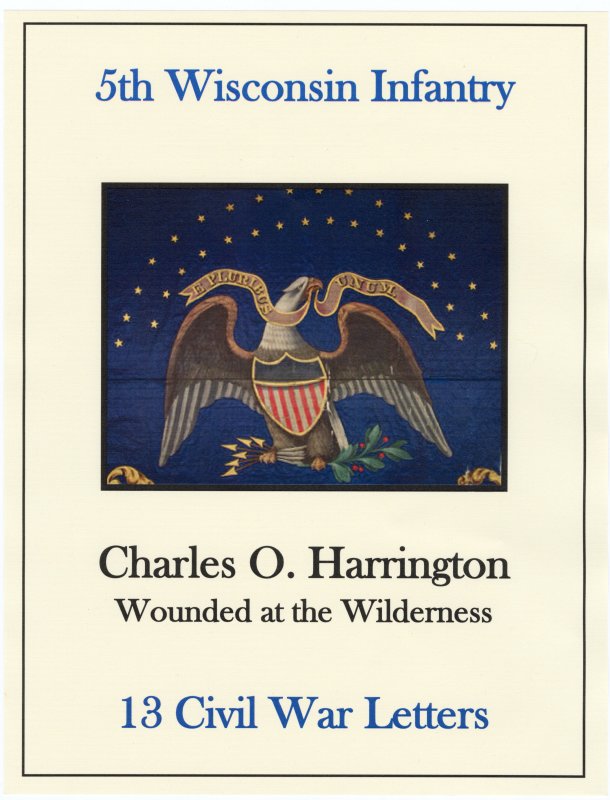5th Wisconsin Infantry Letter Group - Wounded at Wilderness
Item LTR-9224
Charles O. Harrington
Price: $1800.00
Description
This archive is thirteen war dated letters written by Sergeant Charles O. Harrington of the 5th Wisconsin Infantry between December 1861 and August 1864, with discussion of the Battles of Williamsburg, the Seven Days, and Fredericksburg.Three of Harrington’s letters were written from Camp Griffin, near Lewinsville, Virginia, where, as part of General Winfield Scott Hancock’s Brigade, the 5th Wisconsin spent the winter months engaged in picket and outpost duty. Harrington writes of visiting with local friends serving in other units, like Corporal Oscar J. Bassett (8th New York Cavalry), Private David A. Cook (33rd New York Infantry), and Private Robert P. Bush (12th New York Infantry and later Major of 185th New York). On January 23, 1862, Harrington expects that “Tomorrow morning we march for some place. Do not know where we shall go, but think that we shall go down the coast, to the west, or march through to Richmond.”
By the time he wrote the next letter on February 13, however, the 5th Wisconsin was still in camp and Harrington expresses his disappointment “at not going down the coast with Burnside’s fleet” to North Carolina. Still, there was “great excitement in camp” because “the news of the great union victory in North Carolina & Tennessee has just reached us,” meaning Burnside’s victory at Roanoke Island and the surrender of Fort Henry in Tennessee.
In March, the 5th Wisconsin joined the rest of General George B. McClellan’s Army of the Potomac on the Virginia Peninsula. In a May 8 letter to James, Harrington writes that he has “been in one of the greatest battles fought by the Union Soldiers,” the Battle of Williamsburg. Harrington continues:
“The Ball commenced at 6 o’clock on Monday morning May the 5th, lasting 12 hours. The 5th Maine Regiment and the 5th Wisconsin decided the day in our favor. General McClellan said to us last evening that the 5th Wisconsin Regiment should have the Williamsburg battle inscribed on our flag. We fought two regiments against six of the rebels and whipped them nicely. David Cook is well. We were together during most of the fight. Henry Braker is safe also. The loss of our regiment was 11 killed and 50 wounded. From Company E, one killed and 4 wounded.”
In a postscript to this letter, Harrington writes, “enclosed you will find some mementos of the battlefield which I wish you to keep for me until I return, if I ever do, and if I never reach home again, you will keep them in remembrance of me.”
The Union Army’s fortunes had changed considerably by the time Harrington wrote his next letter on July 8 from Harrison’s Landing. While his men had performed well, McClellan had been bested by General Robert E. Lee during the Seven Days battles. A glum Harrington writes:
“You have the particulars of the move of the Army of the Potomac. We had very hard time for eight days and nights, fighting the enemy days and marching nights. We had no sleep nor rest during this time, but we have gained the position sought and whipped the Rebs at every point. Do not expect much from me this time as I do not feel much like writing.”
In an August 27 letter, Harrington encourages James to avoid enlisting. Arguing “one from our family in this is enough.” He also writes that “the Colonel has recommended me to the Governor for promotion.”
In Harrington’s December 28 letter, however, he writes that he did not get the commission he wanted. But reports “I have been appointed Color Sergeant. That is to carry the Stars & Stripes of the 5th Wisconsin.” This letter also described Harrington’s participation in the Battle of Fredericksburg:
“Was very glad to hear from you, especially at that particular time as I was very much discouraged. But I am thankful that I came out of the Battle of Fredericksburg alive. That was a great slaughter pen. What do you think of Burnside? He is a total failure, “Little Mac” is the only man fit to command this army.”
In an April 18, 1863 letter, written shortly before the Battle of Chancellorsville, Harrington writes to his sister Lucy Frances “Frank” Underwood that “we have marching orders with eight days rations. Where we will go, I cannot tell.” While discussing his desire to be at home with his father, he concludes “my country called for me and here I must remain.” He closes this letter asking “how does the people like the Conscript Act? Not very well I guess.”
Indeed, in Harrington’s next letter, written to brother James on August 5, the 5th Wisconsin has been moved to New York City to help maintain order during the draft riots. “You may be somewhat surprised to find that our regiment is in New York,” he writes, “but no more so than myself. There is a good chance for us to stay here the remainder of our time.”
On May 5, 1864, Harrington was wounded in the leg during the fighting along the Orange Turnpike at the Battle of the Wilderness. He recuperated at Jarvis General Hospital in Baltimore, where he wrote an August 18 letter to brother James:
“My leg is doing well, is almost well. Have got detailed as night watch. Could stay here until my time is out if I choose to do so. Shall try and stay here this winter. Am having good time here now. I have to be up all night and sleep days. It is now midnight and I am on the watch.”
Harrington would recover from his wound, but did not return to the front. In October 1864 he instead transferred into the Veteran Reserve Corps, where he served until his muster out in July 1865.

